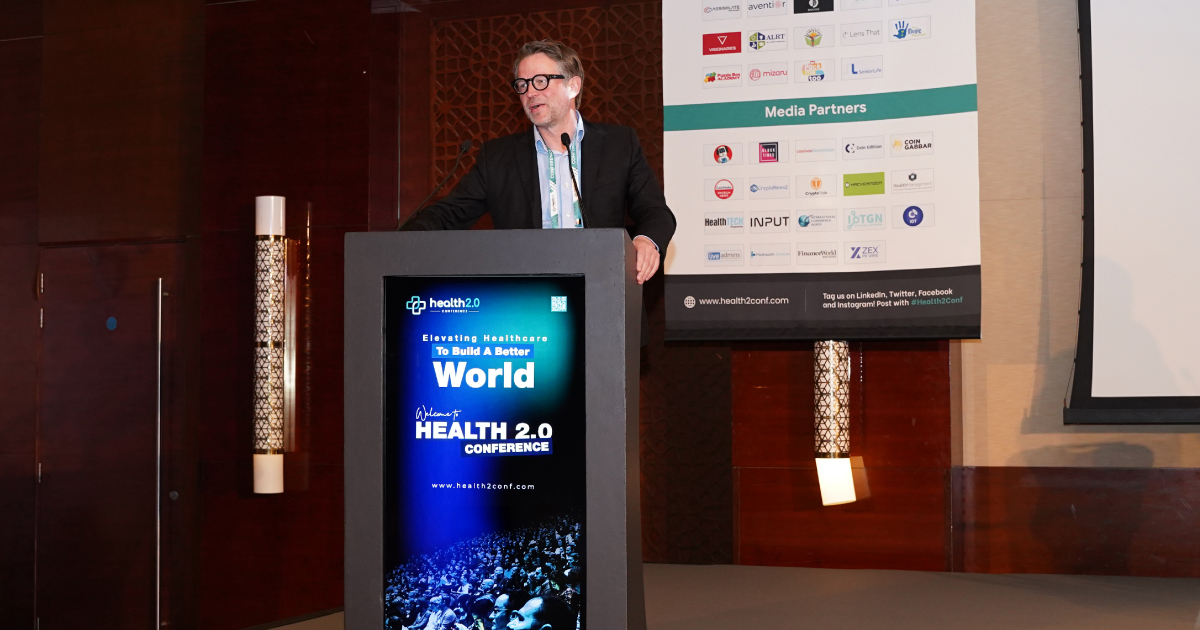Posted on : July 10, 2025

What if stress wasn’t just exhausting your mind but silently increasing your risk of a stroke? Chronic stress doesn’t just make you feel overwhelmed, but rewires your brain, damages your body, and sets the stage for serious health issues. The connection is alarming, but understanding it could be life-changing.
At the Health 2.0 Conference, experts will explore innovative strategies for stress management. Our 2025 healthcare conference will feature discussions on creative approaches to enhancing brain health and promoting overall mental well-being.
This blog reveals the hidden connection between stress and stroke, explains how stress impacts your brain, and offers practical strategies to safeguard your well-being. Are you ready to take control of your health and learn from the best? Let’s dive in.
What Chronic Stress Does To Your Brain?
Stress triggers the body’s “fight-or-flight” response, releasing hormones like cortisol and adrenaline. While helpful in short bursts, prolonged exposure to these hormones disrupts brain function.
- Memory Challenges: Chronic stress can cause the hippocampus to shrink, affecting memory and learning abilities. This makes it harder to recall information and adapt to new situations.
- Emotional Strain: Stress weakens the prefrontal cortex, affecting decision-making and emotional control. It can lead to impulsive behaviors and difficulty regulating moods.
- Inflammation: Persistent stress triggers inflammation, damaging brain cells and disrupting neural communication. Over time, this can lead to cognitive decline.
How Can Stress Lead To A Stroke?
Chronic stress does more than weigh on your mind—it places your entire body under intense strain, silently increasing your risk of stroke. The good news? Understanding how this happens is the first step toward protecting yourself.
- Elevated Blood Pressure: When stress becomes constant, blood pressure stays elevated. This relentless pressure forces your heart to work overtime, weakening blood vessels and causing strokes.
- Arterial Damage: Have you ever heard of stress causing inflammation? That inflammation can lead to plaque buildup in your arteries. Narrowed arteries restrict blood flow to your brain, making blockages and strokes far more likely.
- Heart Overload: Stress overwhelms your mind and forces your heart to work harder than it should. Over time, this added strain wears down your cardiovascular system, increasing your risk of stroke.
Conversations at our healthcare event in Vegas dive deep into these topics, offering strategies to combat stress and safeguard your health. Whether it’s expert advice or innovative tools, these gatherings empower you to take charge of your well-being before stress takes over.
Early Signs Of Stroke You Should Know
Recognizing the early signs of a stroke can save lives. Stress can sometimes mask the warning signs, making it important to remain vigilant.
- Sudden Weakness Or Numbness: This is often felt on one side of the body. It indicates that blood flow to a part of the brain is compromised.
- Speech Difficulty: Slurred speech or trouble understanding words can signal a stroke. It happens when parts of the brain controlling language are affected.
- Vision Changes: Sudden loss of vision in one or both eyes is another key symptom. This occurs when the stroke impacts the optic nerve or the brain’s vision center.
- Severe Headache: A sudden, intense headache with no known cause may indicate a stroke. It is often linked to brain swelling or bleeding.
To improve your chances of recovery, seek immediate medical attention if these symptoms occur. To learn more about stroke prevention, consider attending our healthcare conference in Vegas, where experts share valuable insights and practical strategies. The Health 2.0 Conference will also offer valuable guidance on managing stress and maintaining your health.
How To Manage Stress For Better Health?
Stress management is vital for reducing stroke risk and improving overall well-being. Small, consistent changes can make a big difference.
- Stay Active: Regular exercise lowers cortisol levels and supports cardiovascular health. Activities like walking or swimming can be highly effective.
- Eat Nutritiously: Include foods like leafy greens, fatty fish, and nuts to nourish your brain and reduce inflammation.
- Sleep Well: Aim for at least seven hours of quality sleep each night. Sleep allows the body and brain to recover from daily stress.
- Practice Mindfulness: Meditation and deep-breathing exercises can calm your mind and reduce anxiety.
Source - EverydayHealth
How To Stay Resilient In Stressful Times?
Reducing the impact on health requires proactive steps to strengthen the mind and body. A focused approach can help you manage challenges more effectively.
- Focus On Positivity: Shift your mindset by practicing gratitude and celebrating small achievements.
- Build Supportive Relationships: Spend time with people who uplift and support you.
- Engage In Activities You Love: Pursue hobbies or learn new skills to improve mental flexibility and find joy.
By prioritizing these strategies, you equip yourself to handle stress without letting it take a toll on your health. To explore more effective ways to manage stress, attend healthcare events in Vegas, where experts share the latest solutions and techniques for better well-being.
Technology: A Friend Or A Foe?
Our reliance on digital devices offers both opportunities and challenges. Notifications, constant connectivity, and screen overload can decrease focus and increase stress. The pressure to stay online always leaves little room for mental recovery. On the positive side, mindfulness, fitness tracking, and time management apps provide tools to reduce stress effectively. The key lies in intentional use, making technology work for your well-being instead of against it. Are you using tech to empower yourself or letting it add to your stress?
Time To Take Charge Of Your Health!
Chronic stress is more than just overwhelming—it’s a silent disruptor, damaging your brain and body while increasing the risk of stroke. The good news? You have the power to turn things around with simple yet effective strategies. Connecting with experts at the Health 2.0 Conference, our anticipated healthcare event in 2025, can offer valuable insights into cutting-edge stress management techniques and innovative solutions for better health.
From mindfulness practices to groundbreaking research shared by global leaders, the tools to reduce stress and protect your well-being are at your fingertips. Start with small, meaningful changes and take the first step toward a healthier, stress-free life. Your future self will thank you.
FAQs
Q1. How does chronic stress impact long-term health?
A. Chronic stress goes beyond mental strain, affecting the entire body. Over time, it can contribute to severe health problems such as heart disease, high blood pressure, and cognitive decline. The persistent release of stress hormones disrupts bodily systems, making recovery more difficult and significantly increasing the risk of stroke and other life-threatening conditions.
Q2. How does stress management help prevent stroke?
A. Effective stress management plays a crucial role in stroke prevention. Practices such as mindfulness, regular physical activity, and relaxation exercises help reduce blood pressure, decrease inflammation, and support heart health. Incorporating these habits into daily life provides a powerful defense against stroke and supports brain health.
Q3. What are the long-term effects of stress on brain function?
A. Chronic stress physically alters the brain, particularly the hippocampus and prefrontal cortex. The hippocampus shrinks, impairing memory, while the prefrontal cortex, responsible for decision-making, becomes less effective. These changes lead to cognitive decline, making it harder to think clearly, remember information, and regulate emotions.
Q4. How can attending the Health 2.0 conference benefit stress management?
A. The Health 2.0 Conference is a prime opportunity to explore innovative stress management strategies. Experts share the latest research on stress, its effects on brain and heart health, and practical techniques to reduce its impact. This event provides valuable tools and insights that can help individuals take proactive control over their well-being.
Q5. How does the Health 2.0 Conference contribute to stress management?
A. The Health 2.0 Conference in Vegas brings together global experts who share new research and effective tools for managing stress. The conference offers a unique opportunity to explore the latest advancements in mental health, wellness strategies, and technologies designed to reduce stress. Attendees leave with actionable insights that can transform their approach to stress management and overall health.











